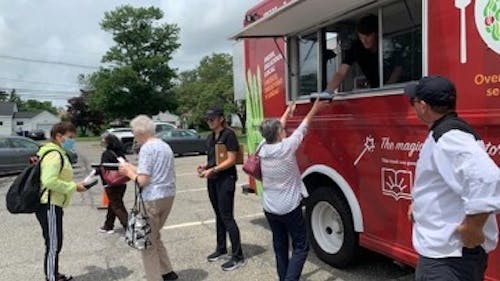Elijah's Promise reports disparity between number of incoming donations, service recipients

Elijah's Promise, a non-profit organization based in New Brunswick that provides social services and meals to local populations, has reported an increased demand for services as incoming contributions decrease.
Michelle Wilson, executive director of Elijah's Promise, said the number of people seeking out the organization's assistance has been increasing since the dissolution of relief programs established during the coronavirus pandemic (COVID-19).
"When the stimulus (programs) ended ... they called it the hunger cliff," she said. "They would say, 'We're on the precipice of the hunger cliff because people are just holding on with these (programs).' And then, when those programs ended, they just brought higher levels of food insecurity."
Elijah's Promise currently provides approximately 30,000 to 40,000 meals a month at both its stationary and mobile kitchens to anyone who requests their services without prejudice, she said. Prior to the pandemic, they provided around 10,000 meals per month.
COVID-19 has also changed the operations of the organization, Wilson said. After the pandemic, Elijah's Promise adjusted its schedule and outsourced its dinner offerings, a change that was welcomed by community members who struggled to obtain transportation to and from the organization's location.
The organization also allows for recipients to receive family packages and can drop off food to individuals who may not otherwise be able to access the soup kitchen. They also operate a traveling service with community partners to serve elderly populations in low-income communities.
She said presently, the main problem facing the organization is a lack of financial support. Wilson said they need money to pay for ingredients, delivery services and wages for the professional culinary staff.
This shortfall in donations is most likely due to economic hardships affecting donors and community members, Wilson said.
"We were powered by small but mighty donation," she said. "(But) people themselves are often struggling now, and we've had a lot of donors come to us and say that they're sorry, they can't support us, or they have to cut their donations."
Elijah's Promise Kitchen has a long history in New Brunswick, dating back to its roots as a community soup kitchen in 1989. Wilson said the kitchen's primary belief has always been to serve everyone with dignity and respect.
In 1997, the organization expanded its offerings by creating the Promise Culinary School, which has enabled hundreds of graduates to enter the food industry.
In 2005, Elijah's Promise began offering health care services by working with Robert Wood Johnson Medical School (RWJMS) to create the RWJMS Homeless and Indigent Population Health Outreach Project (HIPHOP) Promise Clinic.
Michael Enich, a student director at the RWJMS HIPHOP Promise Clinic, said the clinic was created following a joint evaluation between Elijah's Promise and RWJMS on the pressing requirements of unhoused populations in New Brunswick. The evaluation indicated that members of these communities lacking medical insurance were in need of aid, prompting the creation of the clinic.
"Often, we encounter the way that chronic health problems ... can be exacerbated by social conditions: not having a stable place to stay makes it challenging to keep track of medications, for example, or language barriers that make it hard for patients to access charity care services at hospitals," he said.
Care provided by the clinic spans physical and mental health services, psychiatric care and pharmaceutical services, he said. Generally, the Clinic's patients often obtain treatment for diabetes, hypertension and depression, conditions that can be related to larger, societal barriers to health care.
"We do our best to ensure that all of outpatients' needs are met through holistic services and connections to resources that help with these social determinants, through collaboration with Elijah's Promise," Enich said.
Since its creation, the Clinic has changed regarding its populations served, as well as the number of individuals who utilize their assistance, he said.
The populations they currently serve are often Spanish-speaking and of undocumented status, Enich said. They have also grown from serving 15 to 45 patients, all of whom can obtain aid for as long as necessary.
Services are largely provided by Rutgers medical students in their first four years of schooling under the guidance of experts at RWJMS, he said.
Beyond the Clinic, Wilson said the Rutgers community has assisted with the kitchen's operations in various capacities.
She noted that Rutgers Athletics in particular had provided a historic number of meal kits during their past barbecue events. Other Rutgers departments, organizations, alumni and fraternity organizations sometimes assist as well.
Wilson said volunteers are always welcome at the kitchen and called on individuals to unify and engage in community service, especially during the holiday season. She said community members can contribute material resources or work on projects, in-person or virtually.
"It's the holiday season,” she said. "And we have gratitude 365 days a year to people for making this possible, but there's an extra moment that you sort of pause at the holidays, you just look and you think 'Wow all this that we're doing is really because of the amazing supporters and volunteers that we have.'"



